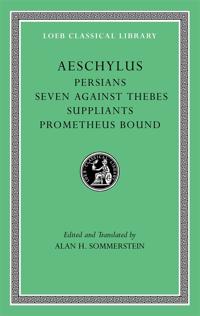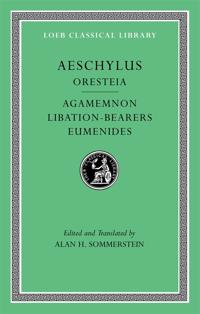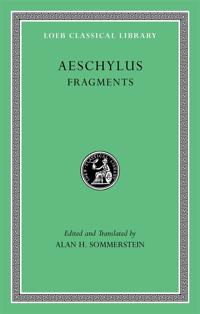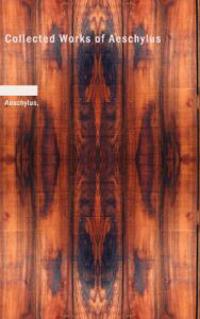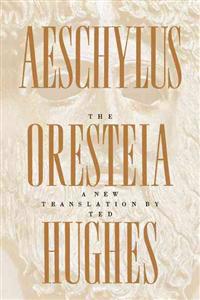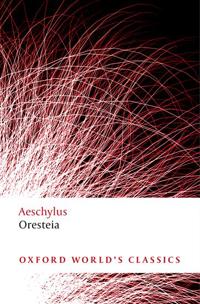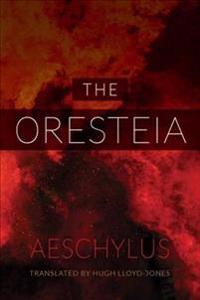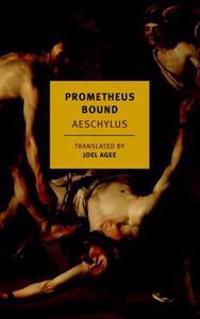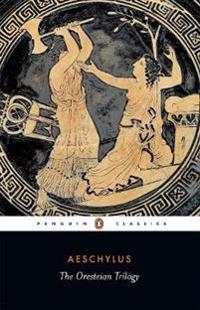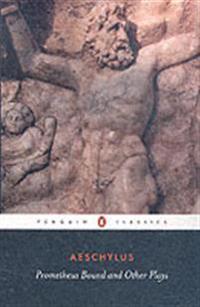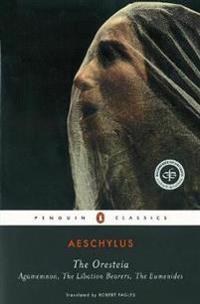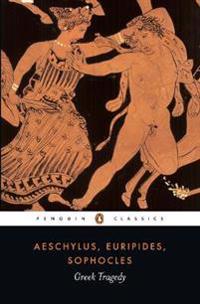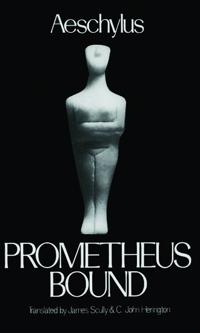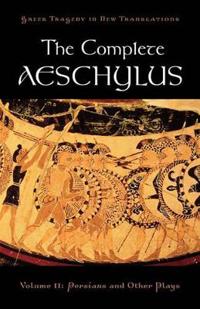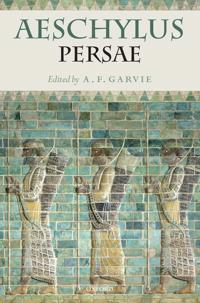Aeschylus (Inbunden)
avAeschylus
ISBN: 9780674996274 - UTGIVEN: 200901Aeschylus (ca. 525-456 BCE), the dramatist who made Athenian tragedy one of the world's great art forms, witnessed the establishment of democracy at Athens and fought against the Persians at Marathon. He won the tragic prize at the City Dionysia thirteen times between ca. 499 and 458, and in his lat[...]
Aeschylus (Inbunden)
avAeschylus
ISBN: 9780674996281 - UTGIVEN: 200901Aeschylus (ca. 525-456 BCE), the dramatist who made Athenian tragedy one of the world's great art forms, witnessed the establishment of democracy at Athens and fought against the Persians at Marathon. He won the tragic prize at the City Dionysia thirteen times between ca. 499 and 458, and in his lat[...]
Aeschylus (Inbunden)
avAeschylus
ISBN: 9780674996298 - UTGIVEN: 200901Aeschylus (ca. 525-456 BCE), the dramatist who made Athenian tragedy one of the world's great art forms, witnessed the establishment of democracy at Athens and fought against the Persians at Marathon. He won the tragic prize at the City Dionysia thirteen times between ca. 499 and 458, and in his lat[...]
Collected Works of Aeschylus (Pocket)
avAeschylus, Edmund Doidge A. (TRN) Morshead, Aeschylus
ISBN: 9781437533637 - UTGIVEN: 2008-03The Oresteia of Aeschylus: A New Translation by Ted Hughes (Häftad)
avAeschylus
ISBN: 9780374527051 - UTGIVEN: 200009In the last year of his life, Ted Hughes completed translations of three major dramatic works: Racine's "Phedre," Euripedes' "Alcestis," and the trilogy of plays known as at "The""Oresteia," a family story of astonishing power and the background or inspiration for much subsequent drama, fiction, and[...]
Oresteia (Pocket)
avAeschylus, Christopher Collard, Aeschylus
ISBN: 9780199537815 - UTGIVEN: 200901Agamemnon *Libation Bearers *Eumenides Aeschylus' Oresteia is the only trilogy to survive from Greek tragedy, and the religious and moral ideas it enacts afterwards influenced a great dramatic genre, as well as giving its three plays their lasting significance. In this family history, Fate and the [...]
The Oresteia (Pocket)
avAeschylus, Hugh (TRN) Lloyd-Jones, Aeschylus
ISBN: 9780520282100 - UTGIVEN: 2014-05The most famous series of ancient Greek plays, and the only surviving trilogy, is the Oresteia of Aeschylus, consisting of Agamemnon, Choephoroe, and Eumenides. These three plays recount the murder of Agamemnon by his queen Clytemnestra on his return from Troy with the captive Trojan princess Cassan[...]
The Oresteia (Pocket)
avAeschylus, Hugh (TRN) Lloyd-Jones, Aeschylus
ISBN: 9781472526793 - UTGIVEN: 2014-06First performed in 458BC, Aeschylus's trilogy of plays - known collectively as The Oresteia - remains perhaps the great masterpiece of Ancient tragic drama. Telling the bloody story of the House of Atreus, Aeschylus's tragedy stages an eternal debate about justice and revenge that remains relevant m[...]
Prometheus Bound (Pocket)
avAeschylus, Joel (TRN) Agee, Aeschylus
ISBN: 9781590178607 - UTGIVEN: 2015-03"Prometheus Bound" is the starkest and strangest of the classic Greek tragedies, a play in which god and man are presented as radically, irreconcilably at odds. It begins with the shock of hammer blows as the Titan Prometheus is shackled to a rock in the Caucasus. This is his punishment for giving t[...]
The Oresteian Trilogy (Storpocket)
avAeschylus
ISBN: 9780140440676 - UTGIVEN: 197307Aeschylus (525-c.456 bc) set his great trilogy in the immediate aftermath of the Fall of Troy, when King Agamemnon returns to Argos, a victor in war. Agamemnon depicts the hero's discovery that his family has been destroyed by his wife's infidelity and ends with his death at her callous hand. Clytem[...]
Prometheus Bound and Other Plays (Storpocket)
avAeschylus
ISBN: 9780140441123 - UTGIVEN: 197306Aeschylus (525-456 BC) brought a new grandeur and epic sweep to the drama of classical Athens, raising it to the status of high art. In "Prometheus Bound", the defiant Titan Prometheus is brutally punished by Zeus for daring to improve the state of wretchedness and servitude in which mankind is kept[...]
The Oresteia (Storpocket)
avAeschylus
ISBN: 9780140443332 - UTGIVEN: 197709The only trilogy in Greek drama that survives from antiquity, Aeschylus' "The Oresteia" is translated by Robert fagles with an introduction, notes and glossary written in collaboration with W.B. Stanford in "Penguin Classics". In the "Oresteia" Aeschylus addressed the bloody chain of murder and reve[...]
Greek Tragedy (Storpocket)
avAeschylus, Euripides, Sophocles
ISBN: 9780141439365 - UTGIVEN: 200408Agememnon is the first part of the Aeschylus's Orestian trilogy in which the leader of the Greek army returns from the Trojan war to be murdered by his treacherous wife Clytemnestra. In Sophocles' Oedipus Rex the king sets out to uncover the cause of the plague that has struck his city, only to diso[...]
Persians And Other Plays (Pocket)
avAeschylus
ISBN: 9780192832825 - UTGIVEN: 2009-01-08An accurate and highly readable new translation with introduction, extensive explanatory notes, and up-to-date bibliography of four of Aeschylus' plays, including the unique historical tragedy Persians and the hugely influential Prometheus Bound.[...]
Prometheus Bound (Häftad)
avAeschylus
ISBN: 9780195061659 - UTGIVEN: 199002The titanic and tragic figure of Prometheus, so familiar to readers of Goethe, Shelley, or Karl Marx, continues to capture the modern imagination. In fact, a simplified image of Prometheus--an image that has little to do with the complex figure created by Aeschylus--has become more prominent and in[...]
The Complete Aeschylus
ISBN: 9780195373288 - UTGIVEN: 2009-03Based on the conviction that only translators who write poetry themselves can properly re-create the celebrated and timeless tragedies of Aeschylus, Sophocles, and Euripides, the Greek Tragedy in New Translations series offers new translations that go beyond the literal meaning of the Greek in order[...]
Complete Aeschylus, The: Volume II: Persians and Other Plays (Inbunden)
avPeter Burian, Alan Shapiro
ISBN: 9780195373370 - UTGIVEN: 2009-06-11Stagecraft of Aeschylus, The: The Dramatic Use of Exits and Entrances in Greek Tragedy (Pocket)
avOliver Taplin
ISBN: 9780198144861 - UTGIVEN: 1989-10-26Revenge Tragedy: Aeschylus to Armageddon (Pocket)
avJohn Kerrigan
ISBN: 9780198184515 - UTGIVEN: 1997-09-04Aeschylus: Persae
ISBN: 9780199269891 - UTGIVEN: 2009-10Aeschylus' Persae, first produced in 472 BC, is the oldest surviving Greek tragedy. It is also the only extant Greek tragedy that deals, not with a mythological subject, but with an event of recent history, the Greek defeat of the Persians at Salamis in 480 BC. Unlike Aeschylus' other surviving play[...]
The Agamemnon of Aeschylus: A Commentary for Students (Pocket)
avThomas, Oliver, Raeburn, David
ISBN: 9780199595617 - UTGIVEN: 2011-11-17This commentary on Aeschylus' Agamemnon offers the reader a thorough introduction, extensive notes, and separate sections which explore Aeschylus' use of theatrical resources, an analysis of his distinctive poetic style and use of imagery, and an outline of the transmission of the play from 458 BC t[...]
The Complete Aeschylus
ISBN: 9780199753635 - UTGIVEN: 2011-01Based on the conviction that only translators who write poetry themselves can properly re-create the celebrated and timeless tragedies of Aeschylus, Sophocles, and Euripides, the Greek Tragedy in New Translations series offers new translations that go beyond the literal meaning of the Greek in order[...]

